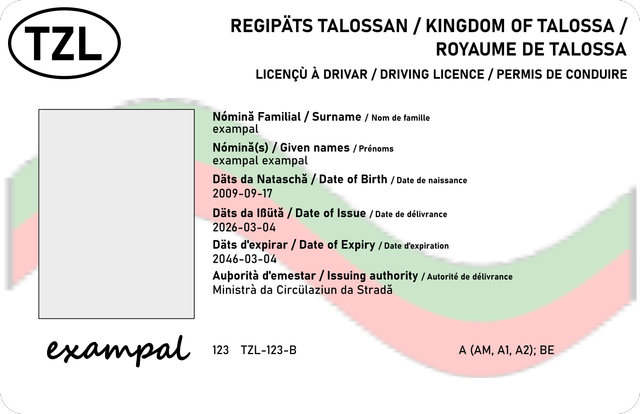- Welcome to Wittenberg.
Recent posts
#11
L'Óspileu/The Chat Room / Re: Talossan driving licence c...
Last post by Barclamïu da Miéletz - Today at 11:30:53 AMQuote from: King Txec on Today at 10:48:56 AMMaybe we should create a new Bureau of Signs and Licensing and put you in charge!Maybe. Or maybe make a Ministry out of it.
-Txec R
#12
El Ziu/The Ziu / Re: MCs for the 62nd Cosă
Last post by Baron Alexandreu Davinescu - Today at 10:53:01 AMSome people are uncomfortable not at the workload, which is minimal, but at the level of responsibility. I think that's perfectly justified. As an MZ, you help make decisions that chart the future of our country.
#13
Wittenberg / Re: Citizenship petition for M...
Last post by King Txec - Today at 10:50:22 AMI'll do it.
Mick
-Txec R
Mick
-Txec R
#14
L'Óspileu/The Chat Room / Re: Talossan driving licence c...
Last post by King Txec - Today at 10:48:56 AMMaybe we should create a new Bureau of Signs and Licensing and put you in charge!
-Txec R
-Txec R
#15
El Ziu/The Ziu / Re: MCs for the 62nd Cosă
Last post by Sir Lüc - Today at 10:25:42 AMQuote from: Baron Alexandreu Davinescu on February 27, 2026, 12:10:31 PMI'm trying to find someone reliable who feels comfortable in the legislature
Sidenote but I am a little concerned about you mentioning people aren't feeling comfortable serving in the Ziu. Talossa doesn't require much from its MZs so maybe it would be worthwhile finding out what's causing so much friction, for the sake of everyone involved.
#16
Wittenberg / Re: Citizenship petition for M...
Last post by Sir Lüc - Today at 10:16:18 AMQuote from: Baron Alexandreu Davinescu on Today at 08:23:19 AMAm I allowed to mick petitions?
Nope.
#17
L'Óspileu/The Chat Room / Re: Talossan driving licence c...
Last post by Barclamïu da Miéletz - Today at 09:14:41 AMHere's the finished front, another image explaining each of the fields will follow soon.

I hope I got any Talossan terms correctly.

I hope I got any Talossan terms correctly.
#18
Wittenberg / Re: Citizenship petition for M...
Last post by Barclamïu da Miéletz - Today at 08:44:05 AMQuote from: Baron Alexandreu Davinescu on Today at 08:23:19 AMAm I allowed to mick petitions?Hey but since I saw somewhere that original petitions would be nice... I've made my own.
#19
Wittenberg / Re: Citizenship petition for M...
Last post by Barclamïu da Miéletz - Today at 08:33:39 AMQuote from: Baron Alexandreu Davinescu on Today at 08:23:19 AMAm I allowed to mick petitions?Who knows. I don't.
#20
Wittenberg / Re: Citizenship petition for M...
Last post by Baron Alexandreu Davinescu - Today at 08:23:19 AMAm I allowed to mick petitions?
